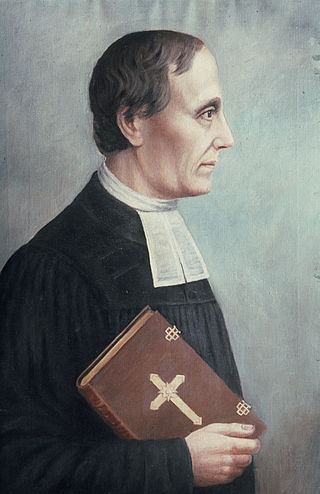
The Evangelical-Lutheran Mission in Lower Saxony (German : Evangelisch-lutherische Missionswerk in Niedersachsen) or ELM is a German Protestant mission organisation. [1]

The Evangelical-Lutheran Mission in Lower Saxony (German : Evangelisch-lutherische Missionswerk in Niedersachsen) or ELM is a German Protestant mission organisation. [1]
The declared mission of the ELM is "... the holistic proclamation of the Gospel in word and deed, through people and projects, in a context which is appropriate to our partner and member churches." [2]
On 12 October 1849 the Hermannsburg pastor, Ludwig Harms, began training the first missionaries. At the outset it was called the Hermannsburg Mission ( Hermannsburg Mission ). Even today young men are trained for service in the church worldwide at the Hermannsburg Mission Seminary (Missionsseminar Hermannsburg).
On 25 May 1977 the ELM was founded as a common facility for the Protestant-Lutheran state churches of Hanover, Brunswick and Schaumburg-Lippe from the amalgamation of the Hermannsburg Mission Centre (also called the Hermannsburg Mission) with the Hildesheim HQ of the Protestant-Lutheran Mission (Leipzig Mission) of Erlangen.
It works closely with the Hessian regional churches (Protestant Church in Hesse and Nassau, Evangelical Church of Hesse Electorate-Waldeck), the Protestant Church of Augsburg Confession of Alsace and Lorraine and over 20 mission and friends' societies.
It retains the legal status of a charity. The headquarters of the ELM (Lower Saxony) is in Hermannsburg. A branch in Hildesheim was closed on 30 June 2006.
Following the fall of the Berlin Wall, the Leipzig Mission was disbanded in 1992 and the Leipzig Evangelical-Lutheran Mission was founded with its base in Leipzig. The focus of its work is India. However, the ELM continues to carry out its own work in India as an independent partner alongside the Leipzig Mission.
Today, the Evangelical-Lutheran Mission in Lower Saxony operates worldwide, sending staff out to the Lutheran churches in Africa, Asia and Latin America and financially supporting their communities and projects.
In 2007 it was working in cooperation with 19 churches in 17 countries abroad. The main focus of effort is in Ethiopia, southern Africa (South Africa, Botswana, Malawi, Swaziland), Latin America (Brazil, Peru), India and non-European Russia.
In addition to theologians the ELM dispatches medical specialists, teachers, craftsmen and farming and administrative experts abroad. In addition it has an annual voluntary programme to give young men the opportunity to work with a partner church and experience different cultures. The ELM is a recognised sending organisation as part of the Volunteer Service of the German Federal Ministry for Economic Cooperation and Development across the world.
The official publication of the ELM is the journal Mitteilen ("Inform") which is issued 6 times a year jointly with other missions.
In the Ludwig-Harms House in Hermannsburg, a conference and management centre with a small café-restaurant, there is an exhibition called Candace - Mission possible which gives an insight into the worldwide work of the ELM and its partner churches.
The ELM is a member of the Evangelical Mission in Germany (EMW).

Lower Saxony is a German state in northwestern Germany. It is the second-largest state by land area, with 47,614 km2 (18,384 sq mi), and fourth-largest in population among the 16 Länder federated as the Federal Republic of Germany. In rural areas, Northern Low Saxon and Saterland Frisian are still spoken, albeit in declining numbers.

The Evangelical Church in Germany, also known as the Protestant Church in Germany, is a federation of twenty Lutheran, Reformed, and United Protestant regional Churches in Germany, collectively encompassing the vast majority of the country's Protestants. In 2022, the EKD had a membership of 19,153,000 members, or 22.7% of the German population. It constitutes one of the largest Protestant bodies in the world. Church offices managing the federation are located in Herrenhausen, Hanover, Lower Saxony. Many of its members consider themselves Lutherans.
The Evangelical Lutheran Church in Thuringia was a Lutheran member church of the umbrella Protestant Church in Germany. The seat of the church was in Eisenach. The church covered those parts of the state of Thuringia that were not part of the former Province of Saxony. It was the largest Protestant denomination in this area.
Hermannsburg is a village and a former municipality in the Celle district, in Lower Saxony, Germany. Since 1 January 2015 it is part of the municipality Südheide. It has been a state-recognised resort town since 1971. It is situated on the river Örtze, about 15 kilometres east of Bergen and 30 kilometres north of Celle. It belongs to the district of Celle.

The Hermannsburg Mission was founded as the Hermannsburg Mission Centre in 1849 in Hermannsburg, near Celle, North Germany, by Louis Harms. In 1977, the independent mission society was merged into the work of the Evangelical-Lutheran Mission in Lower Saxony. As a result, it became an institution recognised by the state church.

The Independent Evangelical-Lutheran Church is a confessional Lutheran church body of Germany. It is a member of the European Lutheran Conference and of the International Lutheran Council (ILC). The SELK has about 33,000 members in 174 congregations. The seat of SELK is in Hanover.

The Evangelical-Lutheran Church of Hanover is a Lutheran church body (Landeskirche) in the northern German state of Lower Saxony and the city of Bremerhaven covering the territory of the former Kingdom of Hanover.

The Evangelical Lutheran Church in Oldenburg is a Lutheran church in the German state of Lower Saxony.

The Evangelical Lutheran Church in Brunswick is a Lutheran church in the German states of Lower Saxony and Saxony-Anhalt.
Lutheran viewpoints concerning homosexuality are diverse because there is no one worldwide body which represents all Lutherans. The Lutheran World Federation, a worldwide 'communion of churches' and the largest global body of Lutherans, contains member churches on both sides of the issue. However, other Lutherans, including the Confessional Evangelical Lutheran Conference and International Lutheran Council, completely reject homosexuality.

Karl Graul was a leader of Leipzig Lutheran mission and a Tamil scholar. He was born in a poor weaver family in Germany. He moved to India as the director of the Lutheran Leipzig Mission in 1849 and there he mastered Tamil.
Hermannsburg is a small hamlet located in the Province of KwaZulu-Natal in South Africa. It is home to the Hermannsburg School.
Buß- und Bettag was a public holiday in Germany, and is still a public holiday in Saxony. In Germany, Protestant church bodies of Lutheran, Reformed (Calvinist) and United denominations celebrate a day of repentance and prayer. It is now celebrated on the penultimate Wednesday before the beginning of the Protestant liturgical year on the first Sunday of Advent; in other words, it is the Wednesday that falls between 16 and 22 November. However, it is not a statutory non-working holiday any more, except in the Free State of Saxony. In the Free State of Bavaria, it is a school holiday only.

Hans Joachim Schliep is a German Lutheran theologian, pastor and author. From 1990 to 1999 he was director of the Amt für Gemeindedienst, and by May 2000 the commissioner for the environment of the Church of Hanover and the Confederation of Protestant Churches in Lower Saxony. From 1999 to 2008 Schliep was the first pastor at the Kronsberg Church Centre and founder of the congregation at the Expo-neighbourhood in Kronsberg, Hanover, Lower Saxony, Germany.

The Evangelical-Lutheran Church of Saxony is one of 20 member Churches of the Protestant Church in Germany (EKD), covering most of the state of Saxony. Its headquarters are in Dresden, and the seat of the bishop is at Meissen Cathedral. Prior to the propagation of state atheism in the German Democratic Republic, it was the largest Evangelical Lutheran church in Germany.
The Hermannsburg Mission Seminary is a seminary in Hermannsburg, Germany. It is part of the Evangelical-Lutheran Mission in Lower Saxony (ELM), the common missionary work of the state churches of Hanover, Brunswick and Schaumburg-Lippe.

Georg Ludwig Detlef Theodor Harms (1808–1865) was a German Lutheran pastor who was nicknamed the "Reviver of the Heath". One of the most significant Christian revivalists of the 19th century, he turned the little village of Hermannsburg on the Lüneburg Heath into the most important centre of revival in Lower Saxony.
The Confederation of Protestant Churches in Lower Saxony is the union of the five regional Protestant churches located in the Lower Saxony. The confederation meets only tasks assigned to it by the national churches. It represents the interests of Protestant regional churches towards the state of Lower Saxony.
The German Protestant Church Confederation was a formal federation of 28 regional Protestant churches (Landeskirchen) of Lutheran, Reformed or United Protestant administration or confession. It existed during the Weimar Republic from 1922 until replaced by the German Evangelical Church in 1933. It was a predecessor body to the Protestant Church in Germany.
The Evangelical Old-Reformed Church in Lower Saxony is a Reformed free church in Lower Saxony with 14 congregations and 7,000 members. The church was established in 1838 in Bentheim, Germany. They separated because of the liberal trends in the Reformed Church of Bentheim. Between 1923 and 2004 the Old-Reformed Church formed part of the Reformed Churches in the Netherlands.